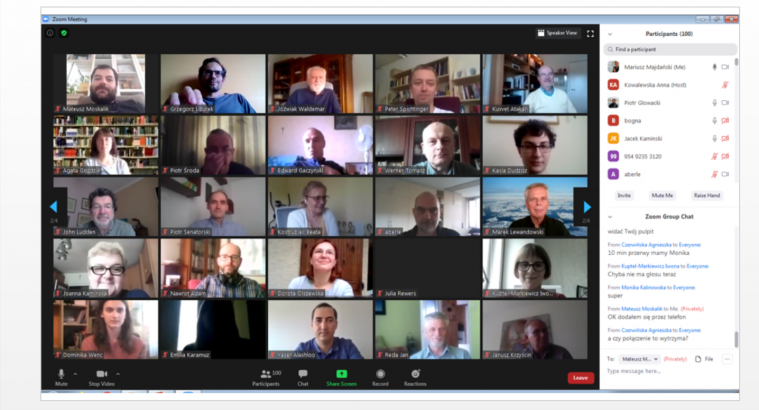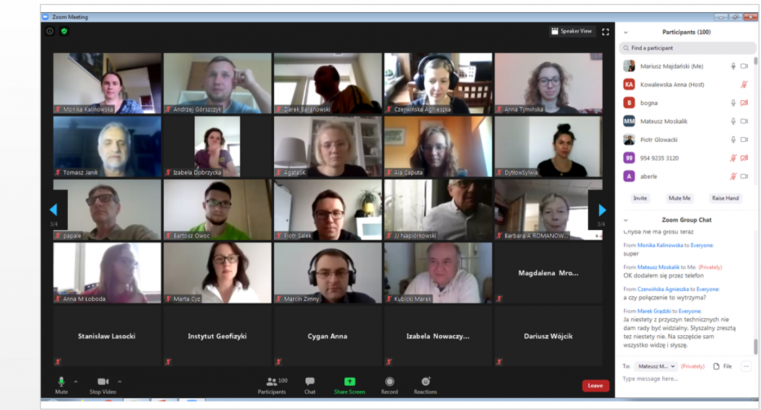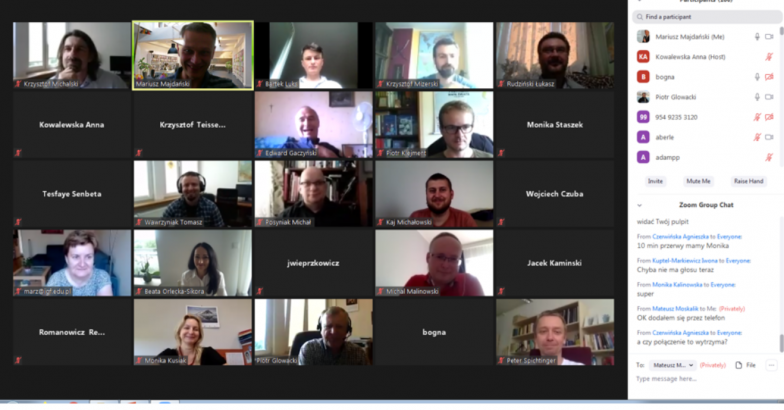12.062020
Scientific achievements and plans for the future presented during a 4-day online session.
For the first time, the report of statutory topics took place in the presence of the International Advisory Board consisted of:
-
Prof. Barbara Romanowicz, Berkeley Seismological Laboratory, USA
-
Prof. Paolo Papale, INGV, Włochy
-
Prof. John Ludden, Heriot-Watt University, Wielka Brytania
-
Prof. Kuvvet Atakan, University of Bergen, Norwegia
-
Prof. Jochen Aberle, Braunschweig University, Niemcy
-
Prof. Peter Spichtinger, Johannes Gutenberg University Mainz, Niemcy
The main task of the International Advisory Board, appointed by arrangement of the director, prof. Beata Orlecka-Sikora, is providing the Director of the Institute with opinions on research and development areas carried out at the Institute, which can ensure the implementation of the IG PAS mission, including guidelines for development, enabling the strengthening the scientific and research position of the Institute in the perspective.
The annual report was also an opportunity to honor outstanding academic and administrative staff. The director's awards for scientific activity went to prof. Michał Malinowski, prof. Michael Nones, dr Dariusz Baranowski and prof. Rafał Szaniawski. The awards went also to prof. Jacek Kamiński, prof. Marzena Osuch and dr Artur Szkop. The team award for the organization of didactics and the establishement of doctoral schools was collected by prof. Piotr Głowacki, prof. Krzysztof Kochanek and Agata szczegielniak-Kwaśniak. Among the awarded administrative employees were Marcin Zimny and Grażyna Kłósek. Special words of thanks and appreciation were directed to prof. RomanTeisseyre and prof. Janusz Borkowski who retired after many years of the valued scientific career.
The chairman of the Annual Report session was prof. Mariusz Majdański, Deputy Scientific Director. Scientists presented their achievements into four main research areas:
DEPARTMENT OF SEISMOLOGY
Stanisław Lasocki - on behalf of all IG PAS research groups active in the area of Anthropogenic and Natural Geohazards and Anthropopression
Łukasz Rudziński- A new insight into anthropogenic seismic processes and seismicity induced by exploitation of geo-resources
DEPARTMENT OF HYDROLOGY AND HYDRAULICS
Krzysztof Kochanek- Annual Reports, 2019. Anthropogenic and natural geohazards & environmental antropopression - Department of Hydrology and Hydraulics
DEPARTMENT OF MAGNETISM
Katarzyna Dudzisz- Application of magnetic methods to the study of environmental pollution, and influence of air pollution on the human health risk in urban environment
DEPARTMENT OF ATMOSPHERIC PHYSICS
Agnieszka Czerwińska- Monitoring and modelling of the biologically active UV radiation for the purposes of Public Health
DEPARTMENT OF GEOPHYSICAL IMAGING
Michał Malinowski- Geophysical imaging techniques for studying changes in the geological medium induced by natural and anthropogenic processes
OBSERVATIONS
Janusz Krzyścin- Atmospheric monitoring
Piotr Sałek- Seismological monitoring
Jan Reda- Long-term magnetic monitoring
HYDROLOGY AND ATMOSHPERE
Michael Nones - Transport processes in rivers, including pollution transport; effect of vegetation on the river fow and transport
Jacek Kamiński - Atmospheric composition observed from satellite platforms
Dariusz Baranowski - Floods in tropics as multi-scale, coupled atmosphere - ocean - land processes
Artur Szkop - Studies of the influence of aerosols on atmospheric optical parameters, UV radiation transfer and atmospheric electricity over Poland
GEOSYSTEM AT VARIOUS SCALES
Rafał Szaniawski- Application of magnetic methods in paleo-environment investigations and paleogeographic interpretation
Monika Kusiak- Geochronology of seismically deformed zircons
Piotr Klejment- Modelling of cracking processes with the DEM method
Mariusz Białecki- Complex systems approach
LITHOSPHERIC RESEARCH
Dariusz Wójcik: Lithospheric Research in Central Europe Based on Seismic Experiments with Controlled Sources
Piotr Środa: Passive seismic research of the upper mantle in Central Europe
Wojciech Czuba: Seismic Research of the Lithosphere in the Arctic (North Atlantic)
GEOPHYSICAL IMAGING
Marta Cyz: Stochastic inversion for reservoir characterization
Miłosz Mężyk: Crustal structure of SE Poland based on PolandSPAN data
Brij Singh: Developments in active seismic methods for mineral exploration
Michał Chamarczuk: Developments in passive seismic methods for mineral exploration
MAGNETISM
Szymon Oryński- Identification of the crust and the upper mantle structure in the area of Poland by applying electromagnetic methods
Rafał Szaniawski- Paleomagnetic methods in studies of geotectonic evolution and deposits formation processes
Dorota Olszewska- Data Management Plan at IG PAS
Renata Romanowicz- Climate change and hydrology
Marek Lewandowski- Why to spend so much money on research in polar regions?
Marzna Osuch- The impact of climate change on extreme hydrological phenomena
Jacek Kamiński- Atmospheric composition observed from satellite platforms
Marek Lewandowski- Dust over Svalbard – local or exotic?
Tomasz Wawrzyniak- Climate variability and ground thermal regime
Bartłomiej Luks- Mass balance of glaciers
Adam Nawrot- Physical and chemical weathering of cryoconite
Michał Malinowski- Geophysical imaging of the permafrost and cryoseismological research at Hornsund
Michał Posyniak- Observations of selected atmospheric parameters at Hornsund and their longterm variability
Krzysztof Michalski- Reconstructing the northern North Atlantic Late Pleistocene - Holocenepalaeomagnetic field – toward a consistent palaeomagnetic time scale


























